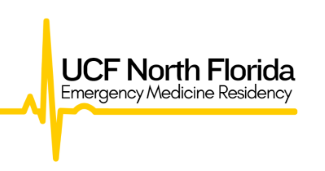Resident Education, Scheduling, Rotations, and More |
| Curriculum |
Our curriculum is designed around new, innovative teaching methods being pioneered in Emergency Medicine and we continue to stay up to date on the most recent research, protocols, and advances in the specialty. We incorporate FOAMed (Free Open Access Medical Education) resources for home study and asynchronous learning modules. We also employ many models of interactive learning including small-group sessions, problem-based learning, simulation, written board review, oral board review, resident lecturers at conference, case reports, question banks, and supply residents with a variety of different methods for studying. We understand that everyone learns differently and we are here to support your learning style!
Alongside this curriculum model, residents receive targeted education based on their residency year to help them grow into expert clinicians.
- PGY-1s go through “Intern Bootcamp” during their first month of residency. Here they are brought up to speed on clinical workups, procedures, and how to thrive in a high acuity emergency department. In addition to receiving ACLS, ATLS, and PALs training, our interns attend the Advanced Pediatric Life Support (APLS) course in Orlando.
- PGY-2s go through small-group teaching sessions with attendings during conference to prepare them for oral board cases. PGY-2 residents complete the Premier EKG Workshop to prepare for third year, and get to attend the FCEP conference, Symposium by the Sea.
- PGY-3s learn how to teach junior residents and medical students and as the year progresses they receive targeted education on transitioning to independent medical practice. They also receive a board prep course and attend the ACEP conference. Additionally, as the cherry-on-top of an amazing residency experience, they are gifted our famous CME cruise as a generous graduation gift from our incredible attendings.
| Didactics |
Our didactic curriculum repeats on an 18-month cycle so each resident will have all of the content presented to them twice during the course of residency. PGY-2 and PGY-3 residents are assigned 2 lectures to present at conference (didactics) throughout the year, and PGY-1 residents present a case presentation of their choosing. There are 5 hours of protected conference time each week. During this time our faculty cover the emergency department so that all residents are free to attend conference. Conference is a great time to mingle with your colleagues and to learn in a safe, fun environment.
| Resources |
All residents receive a subscription for Rosh Review and the Difficult Airway Course every year. Additionally, residents are provided with an array of resources to assist in their learning. These include EM:Rap, Hippo Education, Peer IX, Tintinall’s e-book, National Emergency Medicine Board Review course, Carol River’s Oral Board Review course, Rosh review question bank, and more!
| Research |
Residents are required to complete a scholarly project as well as a quality improvement (QI) project and presentation by the time they graduate. This introduces residents to the academic research process and further solidifies this knowledge in residents who are well-versed in research. The QI project gives residents the chance to invest back in their program by recognizing a need or process that needs improvement and attempting to solve it. We work hand-in-hand with our Quality Improvement Director, Dr. Setty, as well as our Research Director, Dr. Zhou.
| Shift Hours/Requirements |
Shifts vary in length between 9- hour and 12-hour shifts with the majority of shifts being 9-or 10-hour shifts.
Each class must meet a certain number of hours per block, with fewer hours required as you progress through PGY-2 and PGY-3 years. These requirements are applicable to ED blocks only; the hourly requirements and hour limits differ on off-service rotations such as ICU or Trauma.
Vacation blocks will have around 30-40 hours fewer than non-vacation blocks.
PGY-2s and PGY-3s who meet specific requirements may moonlight, however these hours are in addition to the basic hour requirement.
Each “block” is 28-days long. Block scheduling will be discussed below.
Shifts requirements by year:
| Class | Shifts/Block |
| PGY-1 | 19-22 |
| PGY-2 | 17-20 |
| PGY-3 | 15-18 |
| Block Schedule and Rotations |
Each year consists of 13 blocks. Each block is 28-days long which means that every resident experiences every rotation for the same amount of time. It also allows our residents to have more time in the ED vs. a month-to-month schedule.
PGY-1 residents will have 3 weeks of vacation during intern year. This is scheduled 1 week at a time during designated “vacation blocks.”
PGY-2 and PGY-3 residents have 4 weeks of vacation during their 2nd and 3rd years. This is also scheduled 1 week at a time during designated “vacation blocks.”
PGY-3 residents may also choose to focus on a specific track for 3rd year. These include Administration, Research, Ultrasound and EMS.
Rotations by year:
PGY-1
| Rotation | Total Duration |
| Emergency Medicine | 7 blocks |
| Stroke/STEMI * | 1 block |
| Anesthesia/Ultrasound * | 1 block |
| OB/GYN * | 1 block |
| Pediatric Emergency Medicine** | 1 block |
| Trauma*** | 1 block |
| Medical ICU | 1 block |
PGY-2
| Rotation | Total Duration |
| Emergency Medicine*,* | 7 blocks |
| EMS* | 1 block |
| EM/Ultrasound* | 1 block |
| Pediatric Emergency Medicine** | 1 block |
| Trauma*** | 1 block |
| Cardiac ICU | 1 block |
| Pediatric ICU | 1 block |
PGY-3
| Rotation | Total Duration |
| Emergency Medicine*,* | 9 blocks |
| EM Elective* | 1 block |
| EM Selective* | 1 block |
| Pediatric Emergency Medicine** | 1 block |
| Medical ICU | 1 block |
*Indicates a vacation block
**Nemours Children’s Hospital, Orlando, FL- Residents will have an apartment funded by the residency.
***Ocala Regional Medical Center, Ocala, FL- Residents will have an apartment funded by the residency.
